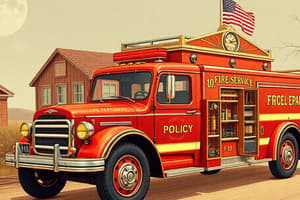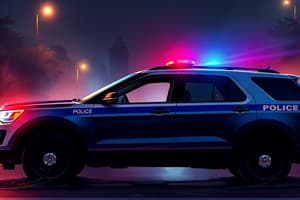Podcast
Questions and Answers
Which of the following tasks are vehicle operators responsible for? (Select all that apply)
Which of the following tasks are vehicle operators responsible for? (Select all that apply)
- Service hydraulic fluid reservoirs (correct)
- Check engine oil levels (correct)
- Repair body damage
- Inflate tires (correct)
Vehicle operators can use cellular telephones while operating an Air Force vehicle.
Vehicle operators can use cellular telephones while operating an Air Force vehicle.
False (B)
What must operators do when they discover a discrepancy affecting safety?
What must operators do when they discover a discrepancy affecting safety?
Discontinue use and report to Vehicle Management immediately.
Operators must keep vehicles ______ at all times to avoid rejection by Vehicle Management.
Operators must keep vehicles ______ at all times to avoid rejection by Vehicle Management.
Match the following prohibitions for vehicle operators:
Match the following prohibitions for vehicle operators:
What should operators do with non-safety related discrepancies?
What should operators do with non-safety related discrepancies?
Vehicle operators should ensure the security of the vehicle and ______.
Vehicle operators should ensure the security of the vehicle and ______.
Which items are considered 'safety related' discrepancies?
Which items are considered 'safety related' discrepancies?
What is a Vehicle Policy?
What is a Vehicle Policy?
What are General Organizational Responsibilities regarding nuclear certified vehicle use?
What are General Organizational Responsibilities regarding nuclear certified vehicle use?
What is the role of Servicing Vehicle Management?
What is the role of Servicing Vehicle Management?
What are Owning/Using Organization responsibilities concerning vehicle attachments?
What are Owning/Using Organization responsibilities concerning vehicle attachments?
What does the Medical Group in Specific Organizational Responsibilities maintain?
What does the Medical Group in Specific Organizational Responsibilities maintain?
What items are Civil Engineering activities responsible for maintaining?
What items are Civil Engineering activities responsible for maintaining?
What responsibilities do Owning/Using Organizations have regarding asset operating compliance?
What responsibilities do Owning/Using Organizations have regarding asset operating compliance?
What are Vehicle Control Official duties?
What are Vehicle Control Official duties?
What are Vehicle Operators responsible for?
What are Vehicle Operators responsible for?
What should Vehicle Operators do prior to each use?
What should Vehicle Operators do prior to each use?
Flashcards are hidden until you start studying
Study Notes
Vehicle Policy
- All non-tactical vehicles acquired by the Air Force are to be fuel-efficient with minimum body size.
- Usage is restricted to official purposes, governed by DoDM 4500.36.
- Responsibility for controlling and conserving vehicle assets falls on all management levels.
- Vehicle users must ensure the operation, conservation, and condition of vehicles.
- Supervisors and appointed Vehicle Control Officials enforce policies outlined in AFI 24-301.
General Organizational Responsibilities
- Vehicle Management provides fleet management and maintenance support.
- Organizations must verify nuclear certification status of vehicles involved in nuclear operations per AFI 63-125.
Servicing Vehicle Management
- Manages vehicle control functions and assists officials with vehicle justifications and maintenance coordination.
- Coordinates scheduled maintenance based on mileage or calendar time.
- Handles unscheduled maintenance reported by Vehicle Control Officials.
- Offers minor roadside assistance during duty hours and for emergencies as per installation procedures.
Owning/Using Organization Responsibilities
- Organizations maintain and replace attachments on vehicles and manage sustainment costs.
- Responsible for major system maintenance and ensuring systems meet standards, including communications and environmental systems.
- Arrangements for repair of locally procured mounts and equipment are made by owning organizations.
- In-house or contracted maintenance is necessary for sensitive or specialized systems.
Specific Organizational Responsibilities
- Medical Group: Oversee maintenance of life-sustaining medical equipment.
- Fire Emergency Services: Responsible for maintenance of firefighting accessories.
- Security Forces: Fund operational security vehicle add-ons and coordinate with Vehicle Management for services.
Civil Engineering Responsibilities
- Maintain cleaning and adjustment of equipment like brooms and blades on vehicles.
- Handle seasonal equipment inspections and operations checks.
- Manage and fund maintenance for installed equipment on trailers and cargo compartments.
Additional Vehicle Responsibilities
- Organizations must comply with local salvage procedures for vehicle disposal.
- Ensure assets on public roads are registered and properly licensed.
- Fund and manage all aspects of vehicle procurement and local maintenance agreements.
Vehicle Control Official Duties
- Act as liaison between units and Vehicle Management for vehicle-related matters.
- Ensure compliance with vehicle registration and licensing programs.
- Monitor maintenance and prevent abuse or damage to vehicles, including issuing accident response protocols.
- Manage fuel and equipment inventories in accordance with Defense Logistics Agency policies.
Vehicle Operators' Responsibilities
- Conduct regular inspections and perform routine maintenance as per Operator's Inspection Guide.
- Use appropriate guides for servicing and checking vehicle fluids and components.
- Maintain cleanliness and report malfunctions to Vehicle Management.
- Ensure safety measures are followed while operating vehicles, including securing cargo and adhering to fuel efficiency practices.### Discrepancy and Malfunction Reporting
- Operators must report any discrepancies or malfunctions that could compromise personnel safety or vehicle operation without delay.
- Relevant guidelines can be found in paragraph 9.16 of the manual.
Transportation of Dangerous Goods
- Serviceable miscellaneous equipment as detailed in ADR Volume II, Section 8.1.5 must be present in vehicles transporting dangerous goods on European public roads.
Vehicle Operator Restrictions
- Operators are prohibited from using cellular phones while operating Air Force vehicles, whether rented, leased, or owned.
- Smoking and tobacco product use is strictly banned in Air Force vehicles.
- Consumption of alcoholic beverages in any government vehicle is not allowed.
- Texting on cellular phones or any electronic devices while driving Air Force vehicles is prohibited.
- Vehicles with expired Certificates of Approval for transporting dangerous goods cannot be used on public highways within the EUCOM AOR.
Vehicle Discrepancies and Reporting Procedures
- Operators must document all discrepancies noted during inspections in the Operator's Inspection Guide and Trouble Report.
- Non-safety related discrepancies should be reported to Vehicle Management within one normal duty day.
- Safety-related discrepancies must lead to immediate discontinuation of vehicle use and prompt reporting to Vehicle Management, either during duty hours or by the next duty day if discovered outside of those hours.
- Disabled vehicles towed outside of normal hours must be turned in to Vehicle Management the following duty day.
Safety-Related Discrepancies to Report Immediately
- Tires and brakes.
- Steering mechanisms.
- Operating levers for power transmission and other operational controls.
- Warning lights including turn signals, brake lights, and emergency lights.
- Headlights, reflectors, and clearance lights, subject to specific usage conditions.
- Windshield wipers and defrosters, especially when weather necessitates their operation.
- Safety equipment unique to special purpose units.
- Any other condition assessed as a safety hazard.
Studying That Suits You
Use AI to generate personalized quizzes and flashcards to suit your learning preferences.




